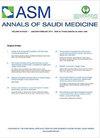Histopathological pattern of endometrial biopsies in patients with abnormal uterine bleeding in a tertiary referral hospital in Jordan
IF 1.8
4区 医学
Q2 MEDICINE, GENERAL & INTERNAL
引用次数: 1
Abstract
BACKGROUND: Abnormal uterine bleeding (AUB) is a symptom that deviates from the normal menstrual cycle. AUB is characterized by changes in the frequency, volume, and duration of the menstrual flow. The etiology of AUB, which varies with age, may be attributed to both structural and non-structural causes. OBJECTIVES: Determine the histopathological pattern of endometrial biopsies in patients with AUB across different age and parity groups who have undergone dilation and curettage (D&C), along with the discrepancy between D&C and histopathological findings after hysterectomy. DESIGN: Retrospective chart review SETTING: Tertiary referral hospital PATIENTS AND METHODS: We collected data on all patients diagnosed with AUB between January 2015 and December 2020. Histopathological findings of all D&C endometrial biopsy samples were examined after being categorized by age and parity groups. Sensitivity, specificity, positive predictive value, and NPV were calculated to evaluate the diagnostic accuracy of D&C. MAIN OUTCOME MEASURES: Histopathological pattern of D&C endometrial biopsies by age and parity groups. SAMPLE SIZE: 3233 patients. RESULTS: Most patients were in the 18-39 year age group, with normal cyclical findings being the most common histopathological finding. Malignant lesions were observed in 42 patients with a majority being older than 50 years. In 13.3% (42/316) of patients, D&C failed to detect intrauterine disorder that was found on hysterectomy. The overall accuracy of D&C in determining the existence of normal versus pathological findings was 75.60%, the sensitivity was 72.90%, the specificity was 77.90%, the positive predictive value was 73.86% and the NPV was 77.05% in our patients. CONCLUSION: Normal cyclic changes account for the highest proportion of histopathological findings. However, hyperplasia and malignancies are important causes of perimenopausal and postmenopausal bleeding. While the use of D&C as a sampling tool for AUB cases remains questionable, the use of D&C in diagnosing premalignant and malignant cases is highly effective. LIMITATIONS: Single-center, retrospective design, incomplete medical records, and inter-rater reliability could not be determined. CONFLICT OF INTEREST: None.在约旦三级转诊医院异常子宫出血患者子宫内膜活检的组织病理学模式
背景:异常子宫出血(AUB)是一种偏离正常月经周期的症状。AUB的特征是月经流量的频率、体积和持续时间的变化。AUB的病因因年龄而异,可归因于结构性和非结构性原因。目的:确定不同年龄组和产次组接受扩张刮除术(D&C)的AUB患者子宫内膜活检的组织病理学模式,以及子宫切除术后D&C和组织病理学结果之间的差异。设计:回顾性图表回顾设置:三级转诊医院患者和方法:我们收集了2015年1月至2020年12月期间所有诊断为AUB的患者的数据。根据年龄组和产次组对所有D&C子宫内膜活检样本进行组织病理学检查。计算敏感性、特异性、阳性预测值和NPV来评估D&C的诊断准确性。主要观察指标:按年龄和产次分组的D&C子宫内膜活检的组织病理学模式。样本量:3233名患者。结果:大多数患者年龄在18-39岁,正常周期性表现是最常见的组织病理学表现。在42名患者中观察到恶性病变,其中大多数患者年龄在50岁以上。在13.3%(42/316)的患者中,D&C未能发现子宫切除术中发现的宫内疾病。在我们的患者中,D&C在确定是否存在正常与病理结果方面的总体准确率为75.60%,敏感性为72.90%,特异性为77.90%,阳性预测值为73.86%,NPV为77.05%。结论:正常周期性变化在组织病理学表现中所占比例最高。然而,增生和恶性肿瘤是围绝经期和绝经后出血的重要原因。虽然使用D&C作为AUB病例的采样工具仍然值得怀疑,但使用D&C诊断癌前和恶性病例是非常有效的。局限性:无法确定单中心、回顾性设计、不完整的医疗记录和评分者间的可靠性。利益冲突:无。
本文章由计算机程序翻译,如有差异,请以英文原文为准。
求助全文
约1分钟内获得全文
求助全文
来源期刊

Annals of Saudi Medicine
医学-医学:内科
CiteScore
2.80
自引率
0.00%
发文量
44
审稿时长
4-8 weeks
期刊介绍:
The Annals of Saudi Medicine (ASM) is published bimonthly by King Faisal Specialist Hospital and Research Centre, Riyadh, Saudi Arabia. We publish scientific reports of clinical interest in English. All submissions are subject to peer review by the editorial board and by reviewers in appropriate specialties. The journal will consider for publication manuscripts from any part of the world, but particularly reports that would be of interest to readers in the Middle East or other parts of Asia and Africa. Please go to the Author Resource Center for additional information.
 求助内容:
求助内容: 应助结果提醒方式:
应助结果提醒方式:


